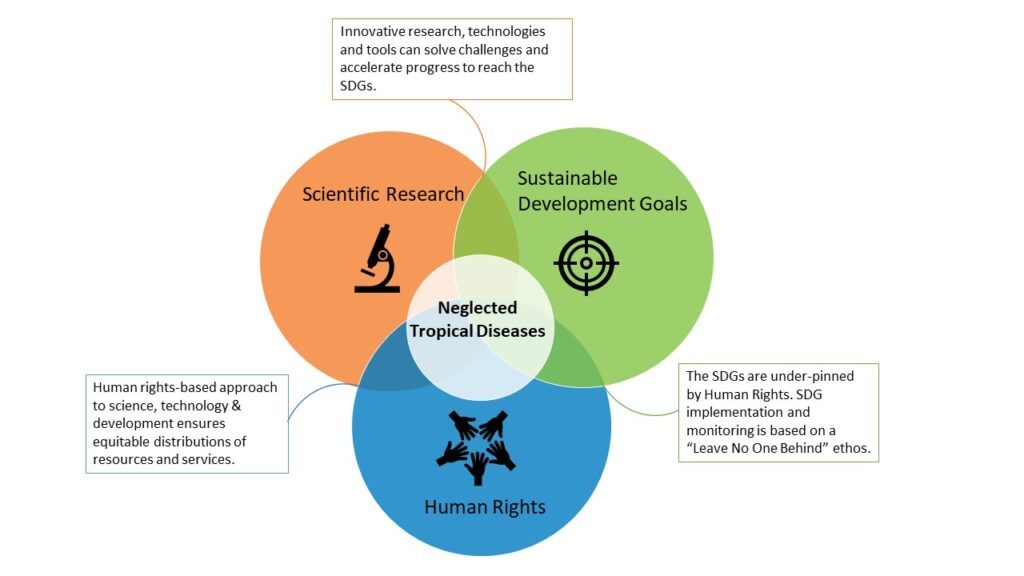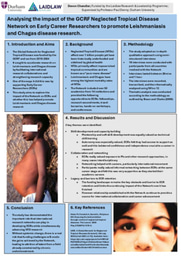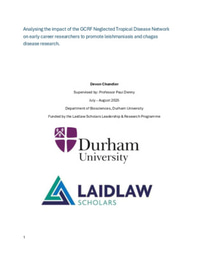Project Outline: Analysing the impact of the Global Network for Neglected Tropical Diseases on ECRs to promote leishmaniasis and chagas disease research in endemic countries.

Project background:
Neglected tropical diseases (NTDs) are a group of bacterial, parasitic, and viral infections which disproportionately affect communities in impoverished tropical areas https://www.who.int/health-topics/neglected-tropical-diseases#tab=tab_1. Despite affecting upwards of 1 billion people and causing 200,000 deaths annually NTDs have historically been neglected by the global health agenda. This is especially true leishmaniasis and Chagas disease, two NTDs which have some of the highest mortality rates.
The historic neglect of NTDs is not limited to funding, but also expertise and poor understanding of these diseases. Furthermore, this neglect is representative of wider structural inequalities in the global health agenda where diseases that primarily affect low-income countries are comparatively ignored compared to those conditions prevalent in higher income countries. These disparities cannot be addressed solely by funding increases but require a sustainable structural change in the conduct of global health research, more specifically by building research capacity in endemic regions.
This is the concept behind the Global Network for Neglected Tropical Diseases https://ntd-network.org/. The network, led by Durham University, sought in its initial phase to democratise and decolonise the study of leishmaniasis and Chagas disease by promoting research in endemic regions. It did this by supporting more than 100 early career researchers (ECRs) through workshops and transnational research partnerships. These ECRs often face limited access to training, mentorship, and resources. By providing these resources the network sought to encourage and facilitate research on leishmaniasis and Chagas disease.
This study will assess the impact of the Network on these ECRs. It will investigate how the support of the Network (training, mentorship, and research collaboration) has influenced ECR career trajectories and research capacity. Furthermore, the study will contribute to broader discussions on how to build an equitable and effective global health research system, and how the Network might serve as a model for the development of similar cross-disciplinary, collaborative and equitable frameworks.
RESEARCH QUESTIONS :
To assess the impact of the NTD Network on ECRs, the following questions will be addressed:
What has been the impact of the NTD Network on the career trajectories of ECRs in endemic countries?
How has the NTD Network’s mentorship and training programs influenced ECRs’ ability to conduct independent research on leishmaniasis and Chagas disease?
What collaborations has the NTD Network catalysed?
How has the NTD Network influenced the career plans and aspirations of ECRs?
Methodology
The study will use qualitative research approach to explore the impact of the Network on ECRs. This approach will capture in-depth, nuanced insights into the experiences, perceptions, and career trajectories of ECRs supported by the Network. Specifically, semi-structured interview questions will be designed to include open-ended questions aligned with the research questions to encourage detailed responses.
Professor Paul Denny, as network director of the NTD network, will identify participants and facilitate the scheduling of the interviews. The study will use a purposive sampling strategy to ensure participants are selected based on their involvement with the Network and diversity in geographic location, although the final selection will be influenced by participant receptiveness and availability.
~20 semi-structured interviews are planned. Beginning with details of how the participant was supported by the Network, the interview guide will be designed to include open-ended questions aligned with the research questions to encourage detailed responses. A small number of pilot interviews will be conducted with the support of Dr Rachel Ramsey, Senior Impact & Engagement Manager in Durham University Research and Innovation Services. These pilot interviews will help refine the interview guide and approach.
To accommodate the wide geographic distribution of participants interviews will be conducted over Microsoft Teams. Interviews will be recorded and transcribed by in built Microsoft Teams software.
Interview transcripts will then be analysed using thematic analysis. Thematic analysis will identify key themes and patterns through a six-step process (familiarisation, coding, theme generation, review, definition, and reporting). The findings will be compiled into a report, which will be shared with Professor Paul Denny, who can publish it in relevant academic journals such as Parasitology (CU) and disseminate it to the stakeholder network (providing the Network with data in support of further activity and evidence the efficacy of a cross-disciplinary, collaborative, and equitable framework in combatting NTDs), and more widely via Twitter and LinkedIn.


Please sign in
If you are a registered user on Laidlaw Scholars Network, please sign in